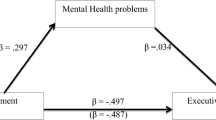Abstract
The purpose of the present investigation was to compare the cognitive functioning of maltreated children with two groups of nonmaltreated children: those matched for age and SES and those matched only on age. All of the children ranged in age from 6 to 16 years. The rationale for employing two comparison groups was to examine the role of maltreatment and SES separately to determine which factor, if any, is associated with children's cognitive functioning. Additionally, the present investigation sought to expand on previous work by employing both global measures of cognitive functioning (WISC-R) as well as measures designed to tap specific abilities (e.g., selective attention, short-term memory). Results indicate that maltreated children demonstrated deficits in cognitive functioning but that these are no more pervasive than those found in children from the same low socioeconomic backgrounds. These findings suggest that it may be deprived family circumstances common in maltreating families, not maltreatment per se, that is responsible for the cognitive deficits often noted in maltreated children.
Similar content being viewed by others
References
Appelbaum, A. S. (1977). Developmental retardation in infants as a concomitant of physical abuse.Journal of Abnormal Child Psychology, 52, 596–602.
Barahal, R. M., Waterman, J., & Martin, H. P. (1981). The social cognitive development of abused children.Journal of Consulting and Clinical Psychology, 49, 509–516.
Bardouille-Crema, A., Black, K. B., & Feldhusen, J. (1986). Performance on piagetian tasks of black children of differing socioeconomic levels.Developmental Psychology, 22, 841–844.
Blau, Z. S. (1981).Black children/white children. New York: Free Press.
Cox, T. (1983). Cumulative deficit in culturally disadvantaged children.British Journal of Educational Psychology, 53, 317–326.
Deutsch, M. (1967).The disadvantaged child. New York: Basic Books.
Dietrich, K. N., Starr, R. H. & Kaplan, M. G. (1980). Maternal Stimulation and care of abused infants. In T. M. Field, S. Goldberg, D. Stern, and A. M. Sostek (Eds.),High risk infants and children. New York: Academic Press.
Egeland, B., Sroufe, A., & Erikson, M. (1983). The developmental consequences of different patterns of maltreatment.Child Abuse and Neglect, 7, 459–469.
Elmer, E. (1977). A follow-up study of traumatized children.Pediatrics, 59, 273–279.Fitch, M. J., Cadol, R. V., Goldson, E., Swartz, D. & Jackson, E. (1976). Cognitive development of abused and failure-to-thrive children.Journal of Pediatric Psychology, 1, 32–37.
Friedrich, W. N., & Einbender, A. J. (1983). The abused child: A psychological review.Journal of Clinical Child Psychology, 12, 244–256.
Friedrich, W. N., Einbender, A. J. & Leucke, W. J. (1983). Cognitive and behavioral characteristics of physically abused children.Journal of Consulting and Clinical Psychology, 51, 313–314.
Frodi, A., & Smetana, J. (1984). Abused, Neglected, and nonmaltreated preschoolers' ability to discriminate emotions in others: The effects of IQ.Child Abuse and Neglect, 8, 459–465.
Garbarino, J. (1976). A preliminary study of some ecological correlates of child abuse: the impact of socioeconomic stress on the mothers.Child Development, 47, 178–185.
Gaudia, G. (1972). Race, social class, and age of achievement of conservation on Piaget's tasks.Developmental Psychology, 1, 158–165.
Gil, D. (1971). Violence against children.Journal of Marriage and the Family, 33, 637–657.
Globerson, T. (1983). Mental capacity and cognitive functioning: Developmental and social class differences.Developmental Psychology, 19, 225–230.
Gregory, H. M., & Beveridge, M. C. (1984). The social and educational adjustment of abused children.Child Abuse and Neglect, 8, 525–531.
Hall, V. C., & Kaye, D. B. (1980). Early patterns of cognitive development.Monographs of the Society for Research in Child Development, 45, Serial No. 184.
Harwick, N. J., & Hochstadt, N. J. (1988). Intellectual functioning in abused-neglected children.Education, 107, 76–82.
Hoffman-Plotkin, D., & Twentyman, C. T. (1984). A multimodal assessment of behavioral and cognitive deficits in abused and neglected preschoolers.Child Development, 55, 794–802.
Jensen, A. R. (1974). Cumulative deficit: A testable hypothesis?Developmental Psychology, 10, 996–1019.
Koski, M. A., & Ingram, E. M. (1977). Child abuse and neglect: Effects on Bayley scale scores.Journal of Abnormal Child Psychology, 5, 79–91.
Laosa, L. M. (1984). Ethnic, socioeconomic, and home language influences upon early performance on measures of abilities.Journal of Educational Psychology, 76, 1178–1198.
Martin, H. P., & Beezley, P. (1977). Behavioral observations of abused children.Developmental Medicine and Child Neurology, 19, 373–387.
McNemar, Q. (1974). Correction to a correction.Journal of Consulting and Clinical Psychology, 42, 145–146.
Oltmans, T. F., & Neale, J. M. (1975). Schizophrenic performance when distractors are present: Attentional deficit or differential task difficulty?Journal of Abnormal Psychology, 84, 205–208.
Perry, M. A., Doran, L. D., & Wells, E. A. (1983). Developmental and behavioral characteristics of the physically abused child.Journal of Clinical Child Psychology, 12, 320–324.
Ramey, C. T., Yeates, K. O., & MacPhee, D. (1984). Risk for retarded development among disadvantaged families: A systems theory approach to preventive intervention.Advances in Special Education, 4, 249–272.
Salzinger, S., Kaplan, S., Pelcovitz, D., Samit, C., & Krieger, R. (1984). parent and teacher assessment of children's behavior in maltreating families.Journal of the American Academy of Child Psychiatry, 23, 458–464.
Sattler, J. M. (1988).Assessment of children. San Diego: Sattler.
Scarr, S. (1981).Race, social class, and individual differences in I.Q. Hillsdale, NJ: Erlbaum.
Steinberg, L. D., Catalano, R., & Dooley, D. (1981). Economic antecedents of child abuse and neglect.Child Development, 52, 975–985.
Wechsler, D. (1974).Manual for the Wechsler Intelligence Scale for Children-Revised. New York: Psychological Corp.
Author information
Authors and Affiliations
Rights and permissions
About this article
Cite this article
Nightingale, N.N., Walker, E.F. The impact of social class and parental maltreatment on the cognitive functioning of children. J Fam Viol 6, 115–130 (1991). https://doi.org/10.1007/BF00978714
Issue Date:
DOI: https://doi.org/10.1007/BF00978714




